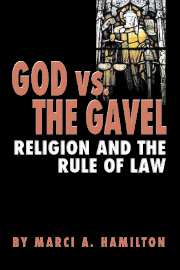Book contents
- Frontmatter
- Contents
- Acknowledgments
- Foreword, by the Hon. Edward R. Becker
- GOD VS. THE GAVEL: RELIGION AND THE RULE OF LAW
- PART ONE WHY THE LAW MUST GOVERN RELIGIOUS ENTITIES
- 1 The Problem
- 2 Children
- 3 Marriage
- 4 Religious Land Use and Residential Neighborhoods
- 5 Schools
- 6 The Prisons and the Military
- 7 Discrimination
- PART TWO THE HISTORY AND DOCTRINE BEHIND THE RULE THAT SUBJECTS RELIGIOUS ENTITIES TO DULY ENACTED LAWS
- Epilogue
- Notes
- Index
3 - Marriage
Published online by Cambridge University Press: 24 July 2009
- Frontmatter
- Contents
- Acknowledgments
- Foreword, by the Hon. Edward R. Becker
- GOD VS. THE GAVEL: RELIGION AND THE RULE OF LAW
- PART ONE WHY THE LAW MUST GOVERN RELIGIOUS ENTITIES
- 1 The Problem
- 2 Children
- 3 Marriage
- 4 Religious Land Use and Residential Neighborhoods
- 5 Schools
- 6 The Prisons and the Military
- 7 Discrimination
- PART TWO THE HISTORY AND DOCTRINE BEHIND THE RULE THAT SUBJECTS RELIGIOUS ENTITIES TO DULY ENACTED LAWS
- Epilogue
- Notes
- Index
Summary
Recent wars of religious power have been intense on the subject of marriage – whether the issue is gay marriage or polygamy. Both topics have earned headlines in the early part of the 21st century, with religious entities intent on imposing their religious viewpoint on public policy. The religious have every right to contribute their religious viewpoints to the public debate and to try to persuade leaders and fellow citizens that their ideas about social problems have merit; wisdom can be found in many corners. But they do not have a right in the United States to mold public policy to their beliefs, and their beliefs alone. The hard choices depend on a more broad-ranging inquiry than any one religious worldview encompasses (even when that perspective is shared by a significant number of individuals and institutions).
The complication in the debates over marriage in 21st century America is that few in government seem to understand or be willing to shoulder their role, which demands significantly more than deference to religious entities. Citizens may speak to them from the heart and soul, but it is up to our elected officials to contextualize the debate by adding the scope of the public good to all public consideration. That is not secularization, as those who would employ religious rhetoric to drown out all discourse might insist, but rather the hallmark of a successful representative democracy.
- Type
- Chapter
- Information
- God vs. the GavelReligion and the Rule of Law, pp. 50 - 77Publisher: Cambridge University PressPrint publication year: 2005

